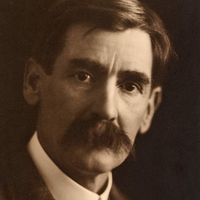A Study in the ‘Nood’
“A Sailor named Grice was seen by the guard of a goods train lying close to the railway-line near Warner Town (S.A.) in a nude condition. He was unconscious, and had lain there three days, during one of which the glass registed 110 in the shade. Grice expressed surprise that the train did not pick him up.” — Daily paper. In consequence, the muse:
He was bare—we don’t want to be rude—
(His condition was owing to drink)
They say his condition was nood,
Which amounts to the same thing, we think
(We mean his condition, we think,
’Twas a naked condition, or nood,
Which amounts to the same thing, we think).
Uncovered he lay on the grass
That shrivelled and shrunk; and he stayed
Three hot summer days, while the glass
Was one hundred and ten in the shade.
(We nearly remarked that he laid,
But that was bad grammar we thought—
It does sound bucolic, we think
It smacks of the barnyard—
Of farming—of pullets in short.)
Unheeded he lay on the dirt;
Beside him a part of his dress,
A tattered and threadbare old shirt
Was raised as a flag of distress.
(On a stick, like a flag of distress—
Reversed—we mean that the tail-end was up
half-mast—on a stick—an evident flag of distress.)
Perhaps in his dreams he persood
Bright visions of heav’nly bliss;
And artists who study the nood
Never saw such a study as this.
The 'luggage’ went by and the guard
Looked out and his eyes fell on Grice—
We fancy he looked at him hard,
We think that he looked at him twice.
They say (if the telegram’s true)
When he woke up he wondered (good Lord!)
‘Why the engine-man didn’t heave to—
'Why the train didn’t take him aboard.’
And now, by the case of poor Grice,
We think that a daily express
Should travel with sunshades and ice,
And a lookout for flags of distress.

